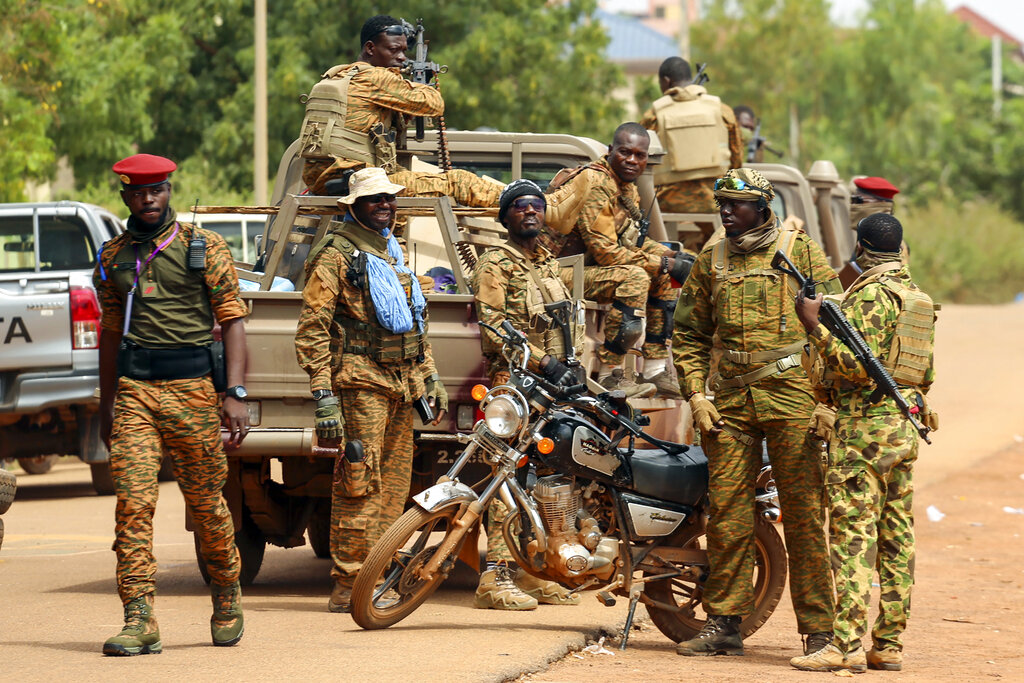ADF STAFF
The Jama’at Nusrat al-Islam wal-Muslimin (JNIM) terror group claimed responsibility for the June 11 attack on a Burkina Faso military base in Mansila that killed more than 100 Soldiers and several civilians. It was the deadliest assault on the Burkinabe military since 2015.
One day later, a rocket hit the parking area of the state-run TV Radiodiffusion Télévision Burkinabé (RTB), in Ouagadougou, the national capital. No one was killed in the blast, although some people were injured.
Capt. Ibrahim Traoré, Burkina Faso’s junta leader, downplayed the incident, saying people guarding the station launched the rocket by mistake, the BBC reported.
These events fueled long-held speculation of internal tensions within the military. As the Institute for the Study of War (ISW) noted, high-casualty terrorist attacks preceded both Burkinabe coups in January and October 2022.
Military sources told Radio France Internationale (RFI) that the rocket incident was linked to the Army’s “internal situation” and that “things are not good.” Jeune Afrique reported that the rocket was fired from the near the presidential palace while Traoré held a meeting and that security had to remove him. Traoré has denied reports of mutiny.
“There’s absolutely nothing to it,” he said outside RTB, according to Al Jazeera. “We are here. We mustn’t listen to these individuals who are trying to distract people. We’re not running away. We’re not backing down, we’re not giving up.”
The junta claimed to thwart coup attempts in September, after reports of unrest among multiple Army garrisons and camps, and January.
Both the public and Burkinabè Soldiers have expressed concerns over the failure of Traoré’s government to contain the country’s security crisis.
The Mansila attack came weeks after JNIM released photos of a training camp In Burkina Faso, a move that demonstrated the group’s ability to brazenly set up rudimentary camps in open areas. Until recently, JNIM had operated its training camps across the border in Mali.
The attack also happened about a week after Russian Foreign Minister Sergei Lavrov visited Burkina Faso and announced plans to send more military instructors to the country. In mid-June, Russian aircraft transported between 80 and 120 Malian and Russian soldiers from northern Mali to Burkina Faso, RFI reported.
An anonymous officer from a Sahel nation also claimed the juntas in Mali and Niger offered “direct support” to Traoré amid the coup rumors, according to the ISW.
The instability comes as hundreds of civilian militia auxiliaries across northern and eastern Burkina Faso have reportedly quit since May 2024 due to high casualty rates, rights violations, withheld salaries and a lack of equipment.
Eight days after the attack on Mansila, several elite Rapid Intervention Battalions relocated from their regional bases near terror-afflicted areas to Ouagadougou, according to the ISW.
Shifting military resources away from conflict areas is likely to decrease “the frequency and effectiveness of defensive and offensive operations around the country as long as security forces are preoccupied,” the ISW’s Liam Karr wrote. “Focusing on regime stability rather than counterinsurgency operations will reduce pressure on insurgent support zones, enabling the insurgents to continue massing in large numbers for overwhelming attacks.”
Traoré took power in 2022 with the promise of eliminating terrorist groups. But since the takeover, both JNIM and the Islamic State Sahel Province group have expanded their territory and increased the death toll from their fight against government forces, volunteer militias and Russian mercenaries with Africa Corps, formerly known as the Wagner Group.
Burkinabe security forces and Russian mercenaries are both accused of committing atrocities against civilians. Last year, deaths due to “deadly violence” in Burkina Faso soared to 8,000, more than twice the number of deaths recorded in 2022, according to the Armed Conflict Location & Event Data.
Traoré got tougher on perceived enemies in the aftermath of the September and January coup attempts. Dozens of people accused of plotting the coups were arrested and military members suspected of being involved were reportedly sent on foreign missions.
“It’s kind of modelled as they’re going on ‘re-education’ training, but when soldiers who criticize you end up being sent to Russia, it doesn’t look good,” Dan Eizenga, an analyst at the Africa Center for Strategic Studies, told Al Jazeera.

